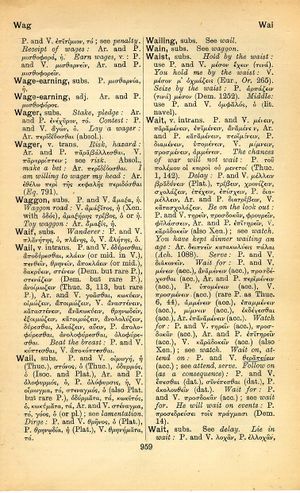wait: Difference between revisions
χαῖρ', ὦ μέγ' ἀχρειόγελως ὅμιλε, ταῖς ἐπίβδαις, τῆς ἡμετέρας σοφίας κριτὴς ἄριστε πάντων → all hail, throng that laughs untimely on the day after the festival, best of all judges of our poetic skill
m (Text replacement - "<b class="b2">Ach.</b>" to "''Ach.''") |
mNo edit summary |
||
| Line 4: | Line 4: | ||
P. and V. μένειν, παραμένειν, ἐπιμένειν, ἀναμένειν, Ar. and P. καταμένειν, περιμένειν, P. διαμένειν, ὑπομένειν, V. μίμνειν, προσμένειν, ἀμμένειν. | P. and V. μένειν, παραμένειν, ἐπιμένειν, ἀναμένειν, Ar. and P. καταμένειν, περιμένειν, P. διαμένειν, ὑπομένειν, V. μίμνειν, προσμένειν, ἀμμένειν. | ||
[[the chances of war will not wait]]: P. τοῦ πολέμου οἱ καιροὶ οὐ μενετοί (Thuc. 1, 142). | |||
[[delay]]: P. and V. μέλλειν βραδύνειν (Plat.), τρίβειν, χρονίζειν, σχολάζειν, ἐπέχειν, ἐπίσχειν, P. διαμέλλειν, Ar. and P. διατρίβειν, V. κατασχολάζειν. | |||
[[be on the look out]]: P. and V. τηρεῖν, προσδοκᾶν, φρουρεῖν, φυλάσσειν, Ar. and P. ἐπιτηρεῖν, V. καραδοκεῖν (also Xen.); see [[watch]]. | |||
[[you have kept dinner waiting an age]]: Ar. δειπνεῖν κατακωλύεις [[πάλαι]] (''Ach.'' 1088). | |||
[[serve]]: P. and V. διακονεῖν. | |||
[[wait for]]: P. and V. μένειν (acc.), ἀναμένειν (acc.), προσδέχεσθαι (acc.), Ar. and P. περιμένειν (acc.), P. ὑπομένειν (acc.), V. προσμένειν (acc.) (rare P. as Thuc. 6, 44), ἀμμένειν (acc.), ἐπαμμένειν (acc.), μίμνειν (acc.), ἐκδέχεσθαι (acc.), Ar. ἐπαναμένειν (acc.). | |||
[[watch for]]: P. and V. τηρεῖν (acc.), προσδοκᾶν (acc.), Ar. and P. ἐπιτηρεῖν (acc.), V. καραδοκεῖν (acc.) (also Xen.); see [[watch]]. | |||
[[wait on]], [[attend on]]: P. and V. θεραπεύειν (acc.); see [[attend]], [[serve]]. | |||
[[follow on]] (as a [[consequence]]): P. and V. ἕπεσθαι (dat.), συνέπεσθαι (dat.), P. ἀκολουθεῖν (dat. ) . | |||
[[wait for]]: P. and V. προσδοκᾶν (acc.); see [[wait for]]. | |||
[[he will wait on events]]: P. προσεδρεύσει τοῖς πράγμασι (Dem. 14). | |||
'''subs.''' | '''subs.''' | ||
| Line 30: | Line 30: | ||
See [[delay]]. | See [[delay]]. | ||
[[lie in wait]]: P. and V. λοχᾶν, P. ἐλλοχᾶν, ἐνεδρεύειν. | |||
[[lie in wait for]]: P. and V. φυλάσσειν (acc.), ἐφεδρεύειν (dat.) (Eur., ''Rhes.'' 768), P. ἐλλοχᾶν (acc.), ἐνεδρεύειν (acc.), V. λοχᾶν (acc.). | |||
[[with ships]]: P. ναυλοχεῖν (acc.). | |||
[[an ambush of armed men lay in wait for him]]: V. τῷ δὲ [[ξιφήρης]] ἆρʼ ὑφειστήκει [[λόχος]] (Eur., ''And.'' 1114). | |||
}} | }} | ||
Revision as of 13:02, 26 October 2019
English > Greek (Woodhouse)
v. intrans.
P. and V. μένειν, παραμένειν, ἐπιμένειν, ἀναμένειν, Ar. and P. καταμένειν, περιμένειν, P. διαμένειν, ὑπομένειν, V. μίμνειν, προσμένειν, ἀμμένειν.
the chances of war will not wait: P. τοῦ πολέμου οἱ καιροὶ οὐ μενετοί (Thuc. 1, 142).
delay: P. and V. μέλλειν βραδύνειν (Plat.), τρίβειν, χρονίζειν, σχολάζειν, ἐπέχειν, ἐπίσχειν, P. διαμέλλειν, Ar. and P. διατρίβειν, V. κατασχολάζειν.
be on the look out: P. and V. τηρεῖν, προσδοκᾶν, φρουρεῖν, φυλάσσειν, Ar. and P. ἐπιτηρεῖν, V. καραδοκεῖν (also Xen.); see watch.
you have kept dinner waiting an age: Ar. δειπνεῖν κατακωλύεις πάλαι (Ach. 1088).
serve: P. and V. διακονεῖν.
wait for: P. and V. μένειν (acc.), ἀναμένειν (acc.), προσδέχεσθαι (acc.), Ar. and P. περιμένειν (acc.), P. ὑπομένειν (acc.), V. προσμένειν (acc.) (rare P. as Thuc. 6, 44), ἀμμένειν (acc.), ἐπαμμένειν (acc.), μίμνειν (acc.), ἐκδέχεσθαι (acc.), Ar. ἐπαναμένειν (acc.).
watch for: P. and V. τηρεῖν (acc.), προσδοκᾶν (acc.), Ar. and P. ἐπιτηρεῖν (acc.), V. καραδοκεῖν (acc.) (also Xen.); see watch.
wait on, attend on: P. and V. θεραπεύειν (acc.); see attend, serve.
follow on (as a consequence): P. and V. ἕπεσθαι (dat.), συνέπεσθαι (dat.), P. ἀκολουθεῖν (dat. ) .
wait for: P. and V. προσδοκᾶν (acc.); see wait for.
he will wait on events: P. προσεδρεύσει τοῖς πράγμασι (Dem. 14).
subs.
See delay.
lie in wait: P. and V. λοχᾶν, P. ἐλλοχᾶν, ἐνεδρεύειν.
lie in wait for: P. and V. φυλάσσειν (acc.), ἐφεδρεύειν (dat.) (Eur., Rhes. 768), P. ἐλλοχᾶν (acc.), ἐνεδρεύειν (acc.), V. λοχᾶν (acc.).
with ships: P. ναυλοχεῖν (acc.).
an ambush of armed men lay in wait for him: V. τῷ δὲ ξιφήρης ἆρʼ ὑφειστήκει λόχος (Eur., And. 1114).

